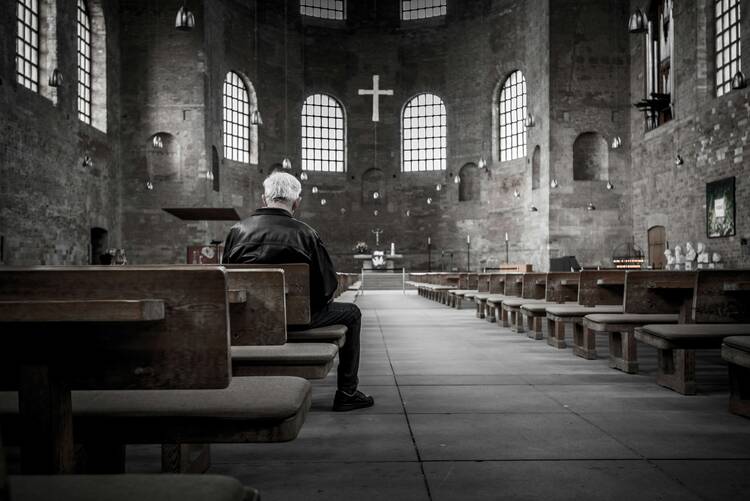In March, the Public Religion Research Institute released a report examining the common phenomenon of “religious churn” in the United States: people leaving the religion in which they were raised. Some of these people join other faith traditions, but many do not. Indeed, P.R.R.I. found that 26 percent of Americans now identify as religiously unaffiliated, a 10-point increase since 2016; and its data suggest that more than one-fifth of people who left their religion identify as former Catholics.
From its polling in both 2016 and 2023, P.R.R.I. concluded that the Catholic Church as a whole had retained less than two-thirds of Americans who were raised Catholic while gaining few new adherents. At 68 percent, Hispanic Catholics had a slightly higher rate of retention. In contrast, white evangelical Protestant and Hispanic Protestant faiths had grown slightly after accounting for those who left and those who joined. A majority (55 percent) of those surveyed who left the Catholic Church identified as “unaffiliated,” meaning that they did not leave the church for another Christian denomination or another faith tradition. Instead, they left organized religion altogether. And only four in 10 of those unaffiliated Americans even describe themselves as “spiritual.” It seems that many Americans think religion has nothing to offer them and that they have no need for whatever religion offers.
The decline in religious affiliation coincides with America’s “historically unprecedented decline in face-to-face socializing,” writes Derek Thompson in a recent essay in The Atlantic. In an increasingly atomized world, it is hard to get people together in any setting, not just a faith-based one. And a religious community needs to be bound together by something greater than the sum of individual agreements.
The most common reason P.R.R.I. respondents cited for leaving their childhood faith was that they “stopped believing in the religion’s teachings” (67 percent said this was an important reason for disaffiliation). Another significant reason for disaffiliation, at 47 percent, was a religion’s “negative” teachings about or treatment of L.G.B.T. people. At first glance, these reasons could suggest that it is primarily the content of religious teaching that is at issue.
But P.R.R.I. also found that only 9 percent of the unaffiliated are looking for a religion that would be right for them. In other words, it is not just that people do not like the religions available to them (a supply problem). There is perhaps an even greater demand problem, a lack of the sense of a need for religion or even spirituality. It may be that “stopped believing,” full stop, is a more important reason for disaffiliation than the teachings themselves.
Often discussions about evangelization can bifurcate into two focuses: on the one hand, clarifying and explaining doctrinal teaching, and on the other, accompanying and meeting people where they are. But if people are not even conscious of a need for religion, the church must also ask how it can help people recognize that the most basic restlessness only finds its rest in God.
“Being Christian is not the result of an ethical choice or a lofty idea, but the encounter with an event, a person, which gives life a new horizon and a decisive direction,” Pope Benedict XVI wrote in “Deus Caritas Est.”
The challenge for Catholics is to inhabit the truth of Christ’s salvation and allow it to change us, to give us life, to bestow us with joy and hope so profound that they radiate from us to all whom we encounter. Within our church communities, we can live out the culture of encounter to which Pope Francis has called us so that all might come to know Jesus. We must be driven toward each other, both within and beyond the walls of church buildings.
During the Easter Vigil this year in France, more than 12,000 adults and adolescents were baptized, an increase of more than a third from 2023 and part of an increasing trend over the past 10 years. Most have not had any formal religious education before seeking baptism; an increasing fraction come from “families without religion.” At a press conference for a report on these baptisms, one of the adults baptized in 2023, Jean-Yves Lépine, said, “It is clearly the encounters,” pointing to “attentive priests, a joyful and dynamic parish community. Through them, I discovered an open and welcoming church, and extremely diverse!”
In his 2013 interview with America and other major Jesuit journals, Pope Francis spoke about the church as a field hospital after battle, that most needs “the ability to heal wounds and to warm the hearts of the faithful; it needs nearness, proximity.”
This does not mean that we should de-emphasize the church’s teaching or the need to explain it clearly. But without an encounter with God, without coming into contact with God’s grace, mercy and love, Christ’s teachings become mere rules, not the saving help they really are. In order for the church’s teachings to be understood as coming from God’s love for us, wounds must be bound up and hearts must be warmed. More than just meeting people “where they are,” this means drawing them out of where they are isolated and helping them imagine a community worth being a part of.
A church of healing, of mercy and of encounter is a church where the beauty of God and human community can be realized. This community is a place where we experience the beauty of God’s merciful love together.
In our increasingly unaffiliated world, we all need reminders that religion has something to offer. But before embarking on a search for a panacea to solve religious decline, we would do well to remember that the transformation of humanity is not our work, but God’s. Our job is to proclaim his saving message through looks of love, encounters that always communicate the reality that “Jesus Christ has saved you.”








